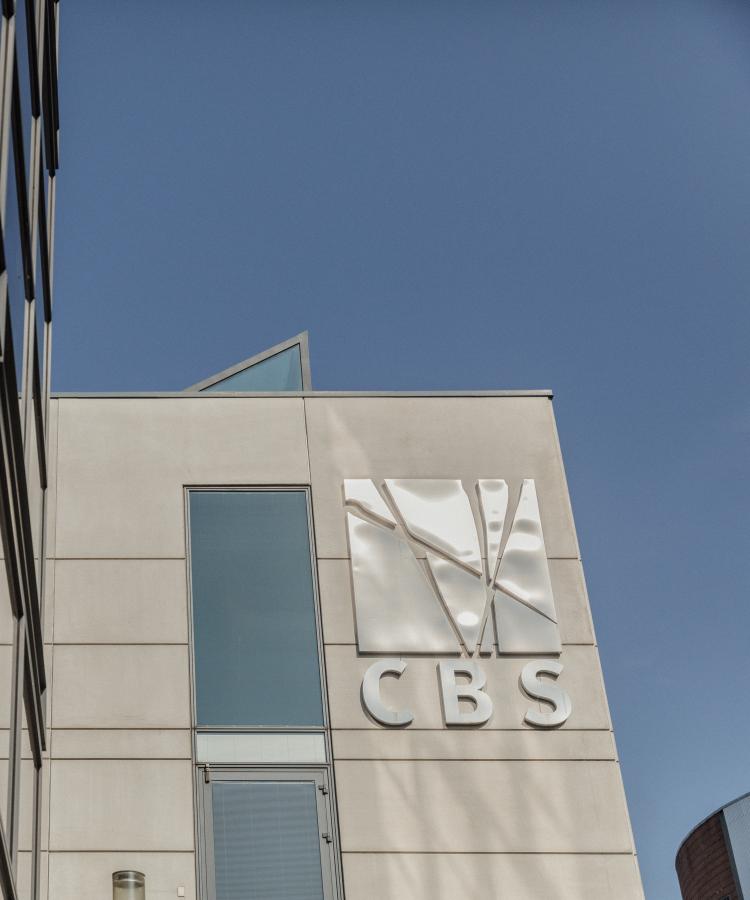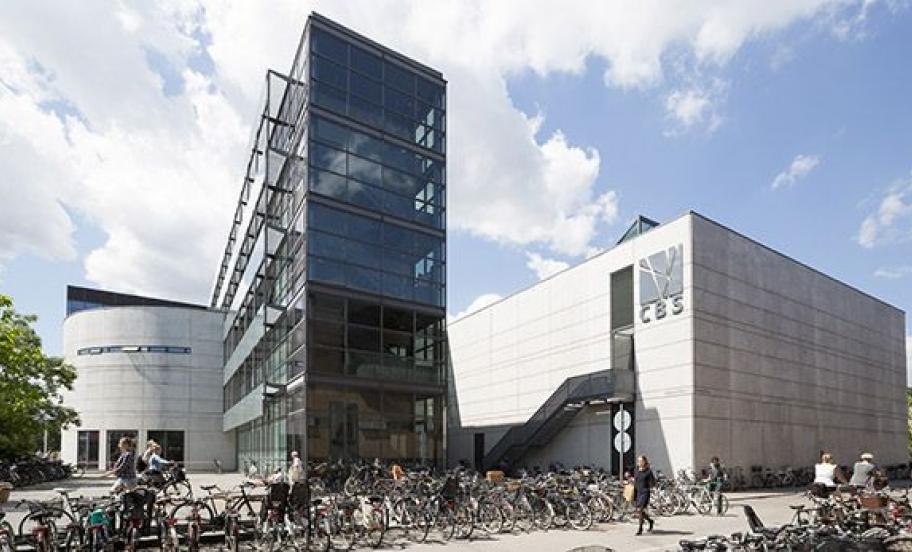MSc in Business Administration and Information Systems
In the MSc IT Programme you will understand the dynamic relationship between IT management, organisational structures, and financial performance. Also, you will get an understanding of how strategic and economic conditions define IT’s role.

Om MSc in Business Administration and Information Systems
Why study MSc IT?
Bridge the gap between business and IT
Make a real impact with technology
Analytical mindset
“The Information Systems degree combines the two worlds, allowing every graduate to choose their own path no matter if it’s technical or business related. ” Malgorzata
Student, MSc IT

Transformation in operations
This programme is designed for students who want to work at the intersection of business and IT. It combines management, strategy, and business understanding with insight into how digital and information technologies shape modern organisations. If you’re curious about how technology transforms the way companies operate, this programme gives you the tools to make that transformation happen.
IT is everywhere
Digital technologies are at the heart of almost everything a company does. Whether it's finance, HR, marketing, logistics, or customer service – IT systems support decisions, manage operations, and help drive growth. That’s why companies need people who understand both the technical and organisational sides of digital business.
Learn to use technology as a tool
You will learn to analyse a company’s needs and identify where technology can create value. This means understanding both what a business wants to achieve and how IT can support that goal. You’ll work with real challenges and develop concrete solutions that are not just technically sound, but also make sense in a business context.
Real skills for real impact
In the programme, you willl learn to simplify complex problems, design effective IT solutions, and turn ideas into action. You will develop both your analytical and creative thinking. Also, you will gain practical experience through group projects, workshops and hands-on case work. This means you will graduate with the ability to solve problems that matter in the real world.
“some of the academic topics covered in certain courses were familiar to me, while others were a bit more challenging to me compared to my peers.” Nikita
Student, MSc IT

Speak two languages
The programme trains you to be the bridge between people who speak “business” and those who speak “tech.” You will learn to communicate across departments and help teams work together to implement digital solutions. This skill is highly valued, especially as companies become more reliant on cross-functional collaboration.
Think critically about technology
This is not just about learning what technology is, but how it works and what it does to organisations. We encourage you to “unbox” digital technologies. To look beyond the interface and understand how software, data, and infrastructure shape behaviour, power, and change. We expect you to engage actively, reflect deeply, and be ready to challenge assumptions.
Read more in the programme regulations
Master events
See upcoming events that can help you with your study choice and admission.
Opbygning
IT og teknologi
You learn how information systems and digital technologies support business strategy, innovation, and decision-making. IT and technology in Business Administration and Information Systems focus on how data, platforms, and digital infrastructures transform organisations and create new opportunities.
Organisation og ledelse
You learn how leadership, collaboration, and organisational structures shape the success of digital initiatives. Organisation and management in Business Administration and Information Systems focus on how people and processes adapt to technological change and drive transformation across organisations.
3 things to consider
Curious about technology and business
Group work and real-world projects
Think independently and handle complexity
Programme overview
1. semester
2. semester
3. semester
4. semester
More about the programme
Double Degree
On MSc IT, you can apply for a double degree with Mannheim Business School. As a double degree student, you get a degree from both CBS and Mannheim Business School.
For the 1st year of your programme, you will study at CBS and for the 2nd year at Mannheim Business School in Germany. This way, you achieve a degree and a diploma from both CBS and Mannheim Business School in Germany.
Learn more about Double Degree
Studying in English
If you do not have a bachelor degree taught in English, we recommend that you read more about what to consider before applying for an English taught programme.
Read more on Teaching and working methods.
Options during the programme
Options during the programme (Panel content)
Electives
On the 3rd semester, you can choose to study courses of your specific interest. CBS offers a large number of electives within a wide range of topics. You can also choose to take electives at other Danish universities. The electives you choose have to be relevant for your programme.
See the current selection of CBS electives on Courses at master level.
Minor
On the 3rd semester, you can also choose to study a so-called minor. A minor is a package of electives within a specific academic area. Typically, it consists of 3 courses. By taking a minor, you strengthen your competences within a specific area of interest, and you can use it to qualify for specific jobs or industries.
See the current selection of CBS minors on Minors.
Exchange
Many students choose to go on exchange on their 3rd semester; usually at one of CBS’ more than 300 partner universities. When you go on exchange through CBS, you do not have to pay for the teaching at the foreign university (with a few exceptions), and you can bring your SU (student grant).
Find a list of all CBS partner universities here.
Internship
You can choose to replace some of your electives with a so-called academic internship. The academic internship consists of an internship period at a company, which is then completed with a project report. You can do the internship at a company in Denmark or abroad.
When doing an internship you get the opportunity to relate theory to practice and reflect on the academic training you receive at CBS in a practical setting. Therefore, the project report and work assignments during your internship have to be relevant to your study programme.
Double Degree
On MSc IT, you can apply for a double degree with Mannheim Mannheim Business School. As a double degree student, you get a degree from both CBS and Mannheim Business School.
For the 1st year of your programme, you will study at CBS and for the 2nd year at Mannheim Business School in Germany. This way, you achieve a degree and a diploma from both CBS and Mannheim Business School in Germany.
Learn more about a Double Degree with Mannheim Business School in Germany.
Master's thesis
Your 2nd year is completed with a master's thesis. You choose the topic you want to write about, which allows you to focus on a specific topic of your interest. Typically, you write your master's thesis with a fellow student.
Double Degree with Mannheim (Panel content)
Option for the MSc IT degree
Copenhagen Business School and The University of Mannheim Business School in Germany are collaborating on an exciting double degree programme for students studying the MSc in Business Administration & Information Systems (CBS) and the Master in Management (Mannheim). This double degree will provide students with an unparalleled opportunity to experience and graduate from two MSc Programmes.
Pursuing a double degree means that not only will you obtain a Master of Science in Business Administration & Information Systems from CBS, you will also obtain a Mannheim Master in Management (MMM) from Mannheim Business School.
If you have chosen or are planning to choose the Master of Science in Business Administration & Information Systems, you should consider this opportunity. You can see the number of seats available for this agreement by checking on my.cbs.dk. You will need your CBS login to do so.
Eligibility and application
Applicants must have English proficiency documented by:
- TOEFL (iBT) test with a result of minimum 94; IELTS Academic with a minimum score of 7; Cambridge C1 Advanced (CAE) minimum score of B; Cambridge CPE minimum score C. Note: MyBest Scores from TOEFL are not accepted.
- Students who have completed their entire Bachelor's degree in English in an English speaking country e.g. UK; Canada; USA; Australia; etc. (Denmark does not count) are exempt from submitting this test.
Tests should preferably not be more than two years old upon application. You may submit a test result that is older than 2 years. However, if you are nominated for the double degree program, the partner university may request an updated English language test in order for you to be accepted. By submitting your application you agree to this condition.
Here you can read more about requirements and application procedures.
| Double Degree Setup | |
|---|---|
| 1st Year at CBS | 2nd Year at Mannheim |
| 1st and 2nd semesters | 3rd and 4th semesters |
| Complete the mandatory courses of the Business Administration & Information Systems programme |
|
It is highly recommended that applicants have had math at least the B level in gymnasium (high school).
Mannheim Business School (MBS) is one of Europe's leading institutions for business education. The University of Mannheim and its School of Business Administration offers a coherent, strategic framework for lifelong business education and are leaders in undergraduate, postgraduate, and executive education.
The University of Mannheim was founded in 1907 originally as a municipal college of commerce. The university’s trademark is its distinct profile. This is characterized by Mannheim’s renowned economic and social sciences which are closely intertwined with humanities, law, mathematics and computer science. Its schools and research institutes cooperate in numerous international research networks. The university has a clear focus on business administration, economics and the social sciences.
The School of Business Administration, which is closely linked with MBS in terms of organization and faculty, is the leading institution in business administration in Germany, according to the rankings of the most important German news and business magazines. The faculty is particularly known for their outstanding research and high teaching standards. In addition, Mannheim is the only German institution to be accredited by AACSB International, EQUIS and AMBA, the three leading international accreditation organizations (Triple Crown).
Mannheim Master in Management (MMM) at the University of Mannheim Business School
The Mannheim Master in Management is in keeping with the tradition of the German Diploma in Business Administration - a trademark and the ideal qualification for a successful career in the economy as well as in research. With the implementations of reforms as a result of the Bologna Process, the high standards of the "Mannheim philosophy" were transferred from the German Diploma in Business Administration to the Mannheim Master in Management.
The Mannheim Master in Management (MMM) is a consecutive study program awarding the academic degree "Master of Science" (M.Sc.) upon successful completion. The standard program length is four semesters.
The chairs of the Business School of the University of Mannheim cover a broad spectrum of fields within the Business Sciences and are well-known for their outstanding research activities.
“stay open-minded and curious throughout the programme and to take advantage of the many opportunities available for learning, networking and personal growth. ” Malgorzata
Student, MSc IT

Studiemiljø
We seek to foster social and professional interactions within the programme and across related programmes at CBS. You will be part of a growing community of technology-oriented study programmes at CBS which creates additional opportunities for fostering a study context of personal and professional value.
BIT-LAB
BIT-LAB is a physical meeting place for students in HA(it.) and MSc in Business Administration and Information Systems to hang out, talk informally, and work on study projects.
Alumni association
There is an active alumni association which hosts events and posts new letters. This offers a chance to talk with alumni and often also companies about career opportunities.
Student life at CBS
Studying at CBS is much more than just preparing for and going to classes.
At CBS, there are more than 20,000 students with different backgrounds and nationalities. Teamwork is an essential part of studying at CBS both in classes and in extracurricular activities.
With more than 100 student organisations, you also have plenty of opportunities to engage and connect with students across programmes and classes.
Learn more about the vibrant student life at CBS, the student organisations, and the international environment on Student life.
For internationals
If you are an international student, we have gathered a lot of information about what it is like to be an international student at CBS and how you can prepare for life in Denmark.
Read more on International students.
Mød de studerende
For internationals
Are you interested in studying at CBS as a full degree or exchange student? Or participating in CBS Summer University? Are you a freemover or do you want to study a single course? Here you can find information regarding how to apply, how to prepare for life in Denmark and what studying at CBS is like. Welcome!

Teaching and exams
Teaching in the programme combines lectures, workshops, hands-on exercises, group work, and case-based seminars. Activities are built around real-world problems, encouraging students to work independently and in teams, with support from instructors.
The focus is on understanding, reflection, and action – not rote memorisation. Exams often involve project work, reports, and oral presentations. Many courses also include mandatory assignments to prepare you for the final exam.
Engaging in society
Because we are addressing the transformational impact of technology, we throughout the programme frequently engage with broader society through seminars, guest lectures, workshops and course projects. In many courses it is an expectation to engage with case organisations in group work through projects that forms the basis for exams.
Read more about Teaching and working methods.
Exams and projects
There are many different types of exams and work methods in Digital Business. Each semester is completed by a group project, in which students apply the theoretical basis of the programme to find practical solutions to cases.
Read more about Exams.
Student life at CBS
Being a CBS student is about more than going to lectures and doing exams.
Get a glimpse of student life at CBS. Here, you can explore what a typical day of teaching and exams looks like.
Also, you can learn how our programmes are structured and read about social life on campus, including the many ways to connect with fellow students.

Time consumption
Workload
You should know that it is demanding to study in a graduate programme, and both the curriculum and workload is significantly higher than at bachelor level.
If you are studying on a full-time graduate programme, you should expect spending approximately 37 hours on average on your studies each week. The workload will vary during the year.
Hectic around exams
The time leading up to assignment submissions and exams can be hectic, and you can easily work more than 40 hours a week in this period. Preparing for oral exams can be especially time consuming, because you have to be able to explain and discuss the covered concepts and theories and learn things by heart.
Read more on Teaching and working methods
Student job
Most programmes are quite flexible in terms of combining studies with a student job. Most students work a maximum of 15 hours a week in order to have sufficient time for their studies.
Studying in Denmark - for internationals
If this is your first time studying in Denmark, you may find teaching and exam formats, the grading scale and the academic calendar very different from what you are used to.
Read about everything you need to know as an international student studying at CBS on International students
In need of special support?
Do you have a disability such as dyslexia, anxiety, autism, ADHD, long-term effects of concussion or another physical, psychological or neurological disability?
Then you have the opportunity to apply for Special Educational Support (SPS) and special conditions while studying.
This ensures you can study on equal terms with your fellow students.

Adgangskrav
Entry requirements
You are qualified for admission to the study programme if you fulfil the following requirements.
Please note that fulfilling the requirements does not guarantee you a study place.
1. Bachelor degree
2. Language requirement
3. Academic requirements
1. Bachelor degree
Bachelor degree
You must hold a bachelor degree to fulfil the general requirement for admission to CBS’ master programmes. You must have completed your bachelor degree before study start.
Legal claim
MSc in Business Administration and Information Systems is the natural progression for
- HA(it.)
If you hold this degree, you automatically fulfil all the entry requirements and you may also have legal claim guaranteeing admission. Read more about legal claim.
Students from other programmes or institutions can also qualify for MSc IT if they fulfil the entry requirements below in terms of academic content and the number of ECTS.
Have you not yet completed your bachelor degree?
You can apply for admission even if you have not yet completed your bachelor’s degree. However, you must finish it before study start. If you are offered a place, you will be conditionally admitted, which means:
- You must complete your bachelor’s degree before you can begin your studies at CBS.
- You must upload your bachelor diploma and transcript no later than 31 August.
2. Language requirement
English B with minimum grade level 6.0 (Panel content)
The language requirement
The language requirement is English at Danish level B, which must be passed with a minimum grade point average of 6.0 on the Danish grading scale.
Documentation deadline
You must fulfil and document the language requirement before the application deadline.
Check if you fulfil the language requirement
In the tabs above, you can see how to document English level B from a Danish upper secondary exam.
If you do not hold a qualifying Danish upper secondary exam, you can see other ways of meeting the requirement.
We only accept the qualifications and documents listed on this page.
Danish upper secondary exam (Panel content)
Required courses and levels
Danish upper secondary exam or
If you have passed English level B from an upper secondary school in Denmark (ie. stx, hhx, htx, hf) you fulfil this requirement.
English level B must be passed with a minimum grade point average of 6.0.
If you have passed English level A, then you also fulfil the English level B requirement.
Supplementary upper secondary courses
English B as a single subject via secondary school supplementation (Gymnasialt suppleringskursus (GSK)) or as a Higher Preparation Examination single subject (HF-enkeltfag).
English level B must be passed with a minimum grade point average of 6.0.
Individual competency assessment (IKV)
If you think you have language competences corresponding to an English level A, you have the possibility to request an assessment - Individuel Kompetencevurdering (IKV) from a Danish VUC (adult education centre).
Required documentation
Danish upper secondary exam or supplementary upper secondary courses
Upper secondary (ie. stx, hhx, htx, hf) certificate:
- a scan/photo of the original, stamped and signed hard copy or
- a digitally signed certificate downloaded from Min Kompetencemappe
Individual competency assessment (IKV)
Official IKV assessment
Other upper secondary exams (Panel content)
Find your country
International Baccalaureate (IB)
Required qualifications
- English A1, higher level - passed
- English A2, higher level - passed
- English B, higher level - passed
- English A1, standard level - passed
- English A2, standard level - passed
- English A Language and Literature, higher level - passed
- English A Language and Literature, standard level - passed
- English A Literature, higher level - passed
- English A Literature, standard level - passed
- English B, standard level - Minimum grade: 5 (equivalent to 6.0 on the Danish grading scale)
Required documentation
Official IB diploma and/or transcript.
Alternatively, you can give CBS access to your results via IBO.org.
European Baccalaureate (EB)
Required qualifications
- L I
- L II
- L III – 6 years
- L III – 4 years
- L IV – 4 years (4 hours)
Grade requirement
Equivalent to 6.0 on the Danish grading scale:
- 2020 and before: minimum 7.50
- From 2021: minimum 7.79
Required documentation
Official EB diploma and/or transcript
Austria
Required qualifications
English as a first foreign language, min. 9 weekly hours accumulated during the final three years of the Oberstufe.
Grade requirement
Equivalent to 6.0 on the Danish grading scale:
- Minimum grade: 3
Required documentation
Reife- und Diplomprüfung diploma certificate including Stundentafel covering (min.) 5 years of the Oberstufe.
Reifeprüfung diploma certificate including Stundentafel covering (min.) 4 years of the Oberstufe.
Australia
Required courses and levels
A complete upper secondary education from Australia, where the majority of the education has been taught in English, fulfils the English B language requirement.
Required documentation
Senior Secondary Certificate of Education (SSCE) as well as Statement of Result or Record of Achievement or Qualifications Certificate, covering subjects and grades during the last two years of the secondary education.
Belgium (French part)
Required qualifications
- English Langue moderne 1
- English Langue moderne 2
Grade requirement
Equivalent to 6.0 on the Danish grading scale:
- Minimum grade: 65
Required documentation
Certificat d’enseignement Secondaire Supérieur (C.E.S.S.): Section générale OR technique OR artistique AND
Grade transcript including the grades and hours for the final 3 years
Bulgaria
Required qualifications
- English as first foreign language (556 hours)
Grade requirement
Equivalent to 6.0 on the Danish grading scale:
- Minimum grade: 3.5
Required documentation
- Diploma za (Zavarsheno) Sredno Obrazovanie / za Sredno Obrazovanie and
- Grade transcript for Years 10, 11 and 12
Canada
Required courses and levels
A complete upper secondary education from Canada, where the majority of the education has been taught in English, fulfils the English B language requirement.
Required documentation
High School Diploma / Graduation Diploma (or equivalent for your province) as well as Transcript of grades / High School Results (or equivalent for your province)
Croatia
Required qualifications
Minimum total sum of 9 weekly lessons* over years 10, 11 and 12 in Foreign Language 1
* We look at the number of lessons, not the number of hours.
Grade requirement
Equivalent to 6.0 on the Danish grading scale:
- Minimum grade: 3
Required documentation
- Svjedodžba o Državnoj Maturi and
- Final 4 years of exam results
Czech Republic
Required qualifications
Minimum 3 lessons per week in the final three years of the Maturita (equivalent to level B2 in the first foreign language according to Eurydice)
Grade requirement
Equivalent to 6.0 on the Danish grading scale:
- Minimum grade: 3
Required documentation
- Vysvedcení o Maturitni zkoušce and
- Exam results for all years of the Vysvedcení o Maturitni zkoušce and
- School document showing the number of lessons per week for the final three years
England, Wales, Northern Ireland
Required qualifications
- A complete upper secondary education taught in England, Wales or Northern Ireland or
- A level English Language or
- A level English Literature
Required documentation
- GCSE certificate(s) (with a min. of 6 subjects) as well as A-level (Advanced level) certificate(s) (with a min. of 3 subjects) both taken in the UK or
- Official A level certificate for either English Language or English Literature
Estonia
Required qualifications
Min. 8 "kursuste arv" in English
Grade requirement
Equivalent to 6.0 on the Danish grading scale:
- 5 (Loputunnistus)
- 66 (Riigieksamenitunnistus)
Required documentation
- Gümnaasiumi Lõputunnistus and
- Hinnetekeht and
- Riigieksamenitunnistus
Finland
Required qualifications
- Minimum 8 English courses
Grade requirement
Equivalent to 6.0 on the Danish grading scale:
- Minimum grade: 7
Required documentation
- Official certificate - Ylioppilastutkintotodistus / Studentexamensbetyg) and
- Official transcript - Lukion päästötodistus/Avgångsbetyg från gymnasiet
France
Required qualifications
- English Langue vivante A
- English Langue vivante B
- English Langue vivante I
- English Langue vivante II
Grade requirement
Equivalent to 6.0 on the Danish grading scale:
- Minimum grade: 13
Required documentation
- Baccalauréat general diploma and
- Relevé des notes
Germany
Required qualifications
- Regardless of federal state: English studied in each of the four half-years of the Qualifikationsphase, passed with an average of 9 points (punkte) or higher in total
- For Waldorfschule/Rudolf Steiner Schule: English passed (9 points (punkte) or higher) as a Prüfungsfach in the Abiturprüfung
Grade requirement
Equivalent to 6.0 on the Danish grading scale:
- Minimum grade: 8 Punkte
Required documentation
- Exam certificate Abiturzeugnis and
- Exam results for exams (finals) and half-year results for the final 2 years
Hungary
Required qualifications
English as a first foreign language
Grade requirement
Equivalent to 6.0 on the Danish grading scale:
- Minimum grade: 3
Required documentation
- Gimnaziumi erettsegi bizonyitvany and
- Gimnaziumi bizonyitvany
Iceland
Required qualifications
For upper secondary studies completed according to the 2008 reform:
Minimum 15 Fein (new credits) obtained in English; of these, minimum 10 Fein must be at Þrep (qualification level) 3 or higher
For upper secondary studies completed according to the 1999 reform:
Minimum 15 einingar (old credits) obtained in English; at least one English subject must be at level 5 or higher (ENS 103+203+303+403+503)
Grade requirement
Equivalent to 2.0 on the Danish grading scale:
- Minimum grade: 7 (modulebase)
Required documentation
- Stúdentspróf (the diploma must include all course codes)
- Remember to upload your Icelandic diploma, not only the English version.
Ireland
Required qualifications
A complete upper secondary education from Ireland, where the majority of the education has been taught in English.
Grade requirement
Equivalent to 6.0 on the Danish grading scale:
4 (Ordinary Level)
3 (Higher Level)
C2
Required documentation
The Established Leaving Certificate Examination (Leaving Cert) with a min. of 6 subjects total
Italy
Required qualifications
- Classico: English as the obligatory first foreign language
- Scientifico: English as the obligatory first foreign language
- Linguistico: English as the obligatory first, second or third foreign language
- Artistico: English as the obligatory first foreign language
- Scienze umane: English as the obligatory first or second foreign language
- Musicale e coreutico: English as the obligatory first foreign language
Grade requirement
Equivalent to 6.0 on the Danish grading scale:
- 8 (0-10 scale)
- 45 (0-60 scale)
- 72 (0-100 scale)
Required documentation
- Diploma di Esame di Liceo (Classico/Scientifico/Linguistico/Artistico/Scienza Umane/Musicale e Coreutico) and
- Scrutinio di quinta superior
Latvia
Required qualifications
The obligatory course in English (first foreign language) fulfils the requirement
Grade requirement
Equivalent to 6.0 on the Danish grading scale:
- Minimum grade: 6
Required documentation
- Atestâts par vispârējo vidējo izglîtîbu and
- Pielikums atestâtam par vispârējo vidējo izglîtîbu and
- Vispârêjâs vidējâs izglîtîbas sertifikâts
- Izglîtîbas satura un eksaminâcijas centra sertifikâts (only if there is a State exam in one or more subjects)
Lithuania
Required qualifications
- English (1. foreign language) as bendrasis kursas (basic level)
- English (1. & 2. foreign language) as isplestinis kursas (high level)
Grade requirement
Equivalent to 6.0 on the Danish grading scale:
- Minimum grade: 6
Required documentation
- Brandos Atestatas and
- Brandos Atestatas Priedas
Luxembourg
Required qualifications
- A minimum of 210 full teaching hours (of 60 minutes per hour) with an exam passed at upper secondary school level
Grade requirement
Equivalent to 6.0 on the Danish grading scale:
- Minimum grade: 41
Required documentation
- Diplôme and
- Certificat de notes
Malta
Required qualifications
- I level English
Grade requirement
Equivalent to 6.0 on the Danish grading scale:
- Minimum grade: D
Required documentation
- Matriculation Certificate and Advanced Level Certificate and Intermediate Level Certificate
The Netherlands
Required qualifications
- The obligatory course in English fulfils the requirement
Grade requirement
Equivalent to 6.0 on the Danish grading scale:
- Minimum grade: 8
Required documentation
- Voorbereidend Wetenschappelijk Onderwijs Diploma and
- Cijferlist
Norway
Required qualifications
- Engelsk VG English 1 (SPR3029 & SPR3030)
or - Engelsk VG2 International English (SPR3008 & SPR3009)
Grade requirement
Equivalent to 6.0 on the Danish grading scale:
- Minimum grade: 4 (average of all courses)
Required documentation
- Official (digitally signed) transcript for the Vitnemål for videregående opplæring
New Zealand
Required qualifications
A complete upper secondary education from New Zealand, where the majority of the education has been taught in English, fulfils the English B language requirement.
Required documentation
National Certificate of Education Achievement (NCEA) levels 1 and 2 and 3
Portugal
Required qualifications
- Cursos gerais do ensino secundário - Humanidades: 1. Foreign Language in English
- Cursos científico-humanísticos: The obligatory 1. Foreign Language in English or English as Opçoes C og D
Grade requirement
Equivalent to 6.0 on the Danish grading scale:
- Minimum grade: 15
Required documentation
- Exam certificate and
- Documentation from school confirming the level of your subjects/your total number of classes within the specific entry requirements
Romania
Required qualifications
- Theoretical line: Humanities; Specialisation: Filologie English fulfils the entry requirement
- Theoretical line: Humanities; Social Studies English fulfils the entry requirement
Grade requirement
Equivalent to 6.0 on the Danish grading scale:
Minimum grade: 6.4
Required documentation
- Diploma de bacalaureat and
- Foaie matricola
Scotland
Required qualifications
A complete upper secondary education from Scotland, where the majority of the education has been taught in English, fulfils the English A language requirement.
Required documentation
Scottish Qualification Certificate as well as Summary of Attainment, Detail Record of Attainment and Profiles
Singapore
Required qualifications
A complete upper secondary education from Singapore, where the majority of the education has been taught in English, fulfils the English B language requirement.
Required documentation
Singapore-Cambridge GCE A-level exam certificate with a min. of 4 (H1, H2 and H3) exams total, as well as General Paper and Project Work
Slovakia
Required qualifications
- 1. Foreign Language in English with a minimum of 210 taught hours
Grade requirement
Equivalent to 6.0 on the Danish grading scale:
- Minimum grade: 3
Required documentation
- School-Leaving Exam Certificate – Vysvedcenie o maturitnej skúske and
- Supplement to Certificate of School-Leaving Examination and
- Grade transcripts for years 10, 11 and 12
Slovenia
Required qualifications
- The obligatory course in English as first foreign language fulfils the requirement if passed during the 2nd, 3rd and 4th year.
Grade requirement
Equivalent to 6.0 on the Danish grading scale:
- Minimum grade: 3
Required documentation
- Spricevalo o splosni maturi / Maturitetno sprièevalo and
- Obvestilo o uspehu pri splosnui mature and
- Letno spricevalo for the 4th year
South Africa
Required qualifications
A complete upper secondary education from South Africa, where the majority of the education has been taught in English, fulfils the English B language requirement.
Required documentation
National Senior Certificate (Matric/Matriculation Certificate) as well as grade transcript covering subjects and grades during all three years of studies
Spain
Required qualifications
- English as the obligatory first foreign language
Grade requirement
Equivalent to 6.0 on the Danish grading scale:
- Minimum grade: 7
Required documentation
- Título de Bachiller / Bachillerato exam certificate
Sweden
Required qualifications
- Before 2014: Engelska min. Kurs C
- After 2014: Engelska steg 7 (ENGENG07)
Grade requirement
Equivalent to 6.0 on the Danish grading scale:
- Minimum grade: C (A to F scale) 15 / VG (Prior to the latest reform)
Required documentation
- Official transcript for Gymnasieexamen från ett högskoleförberedande program or Slutbetyg från Gymnasieskolan
United States
Required qualifications
A complete upper secondary education from the United States, where the majority of the education has been taught in English, fulfils the English B language requirement.
Required documentation
High School Diploma as well as High School Grade transcript (covering all four years’ worth of subjects and grades) taken in the US.
Language tests (Panel content)
TOEFL
TOEFL iBT/iBT Home Edition
The TOEFL iBT/ iBT Home Edition taken on or after 21 January 2026 must be passed with both
- a minimum overall score of at least 5 and
- a minimum score of 4,5 in each of the four different sections
Exceptionally, we accept an overall score of 94 (old scale) and 4,5 (new scale) in 2026. Both of these results must be present on the certificate. The subscores must still be a minimum of 4,5 in each of the four sections.
The TOEFL iBT/ iBT Home Edition taken before 21 January 2026 must be passed with both
- a minimum overall score of at least 94 and
- a minimum score of 20 in each of the four different sections
MyBest scores are not accepted.
Read more about the TOEFL and how to register on ETS.org.
Documentation
Your TOEFL scores will be verified in the TOEFL database. You must list Copenhagen Business School as one of your score recipients when you sign up for the TOEFL test, or order a score sheet for Copenhagen Business School if you have already taken the test.
The TOEFL institution code for CBS is 7035.
You must upload either your digital copy, or a scan of your hard copy, TOEFL score sheet to the Application Portal.
Have you already passed a test?
Remember to check that your test date is no older than two years by the application deadline.
Be aware that it is your test date and not the date your test results were issued. If your test date is more than two years old by the application deadline, your test will not be accepted.
IELTS
IELTS Academic test
An IELTS academic test result of at least 7.0 with minimum 6.0 in each discipline is required.
IELTS tests that are more than two years old by the application deadline are not accepted
IELTS Online is accepted.
IELTS One Skill Retake scores are not accepted.
Read more about IELTS and how to register
Required documentation
Your IELTS results will be verified in the IELTS database. Please instruct your test centre to make your results available to Copenhagen Business School, either when you book your IELTS test or after the test date.
You must also upload a scan of your IELTS test report form to the Application Portal.
If you have not received the physical test report form, you can upload a document with the "Test Report Form Number" (TRF Number) so we can verify your scores.
Have you already passed a test?
Remember to check that your test date is no older than two years by the application deadline.
Be aware that it is your test date and not the date your test results were issued. If your test date is more than two years old by the application deadline, your test will not be accepted.
Cambridge
Cambridge exam
The following Cambridge exams/certificates fulfil language requirement.
- Cambridge C2 Proficiency (Certificate of Proficiency in English) passed with minimum C and an overall score of minimum 200.
Read more about the CPE and how to register.
- Cambridge C1 Advanced (Certificate of Advanced English) passed with minimum C and an overall score of minimum 185.
Read more about the CAE and how to register.
Documentation
In order for us to verify your results, you need to do the following:
- Sign up and share your results with Copenhagen Business School via the Candidate Results Website. Your Cambridge results are only valid if we can check them on their website.
- Upload your Cambridge C2 Proficiency (CPE) or Cambridge C1 Advanced (CAE) Statement of Results and/or Certificate in the application portal
The Certificate of Proficiency in English and Certificate of Advanced English have no expiration date and are valid for life.
CBS bachelor degree (Panel content)
English-taught bachelor degree from CBS
Applicants with an English-taught bachelor degree from CBS who continue their studies in English at master level have already had their qualifications checked and do not need to upload additional documents.
Danish-taught bachelor degree from CBS
If you have a Danish-taught bachelor degree from CBS, you must document that you fulfil English B with minimum grade level 6.0. If you have legal claim, you do not need to upload documentation for the language requirement.
3. Academic requirements
Your educational background will be subject to an overall individual assessment in order to establish if your bachelor's degree qualifies you for the programme and the academic areas listed below are covered in full and as prescribed.
The academic entry requirements are 60 ECTS of the following areas:
- 5 ECTS in Micro- and/or Macro-economics
- 25 ECTS in Business Administration (examples include: organisation, management, strategy, accounting, finance, marketing, innovation/entrepreneurship, CSR, microeconomics, macroeconomics)
- 30 ECTS in Information Technology (examples include: information technology, computer science, programming, computer algorithms, information management,information systems, computer-mediated communication, information architecture and design, systems design)
Check if you fulfil the academic requirements
Advance assessment (Panel content)
Check the advance assessments
CBS Admissions cannot make a pre-assessment of your individual qualifications before you apply for admission.
Find your bachelor programme
Instead, we have assessed a number of bachelor programmes. In these so-called advance assessments, you can see whether your bachelor degree fulfils the academic entry requirements.
An advance assessment shows whether the obligatory courses in your bachelor programme fulfil the academic requirements for a master programme at CBS. We typically prepare an advance assessment when many applicants from the same bachelor programme apply for the same master programme.
You can find them by clicking on the tabs above.
Missing courses?
If you are missing courses, you may be able to fulfil the requirements through relevant elective courses or supplementary courses.
See what to do if you are missing courses to fulfil the academic requirements.
No advance assessment?
If your bachelor programme is not listed under the tabs above, you can make your own assessment of to what extent you meet the entry requirements through the courses you have taken in your bachelor programme and any supplementary courses.
Use the form below.
CBS (Panel content)
Potentially qualifying bachelor degrees
Check to see which academic areas you are missing in order to fulfil the academic requirements in 2026:
HA(mat.)
Enrolled in 2022 or 2023
- 15 ECTS in Information Technology
HA Almen
Enrolled in 2022 or 2023
- 30 ECTS in Information Technology
BSc in Business Administration and Digital Management
Enrolled in 2022 or 2023
- 5 ECTS in Information Technology
Denmark (Panel content)
Potentially qualifying bachelor degrees
Check to see which academic areas you are missing in order to fulfil the academic requirements in 2026:
ITU Global Business Informatics
Enrolled in 2022 or 2023
- 5 ECTS in Micro- and/or Macroeconomics
KEA - Business Economics and IT (KEA)
Enrolled in 2022 or 2023
- 5 ECTS in Micro- and/or Macroeconomics
Make a self-assessment
What is a self-assessment?
If there is no advance assessment available for your bachelor’s degree, you can make a so-called self-assessment of your educational background.
If there is an advance assessment of your bachelor degree showing that you are missing certain academic areas to fulfil the academic requirements, you can also use the self-assessment to show how you fulfil the missing academic areas.
Your self-assessment is not binding for us, but it can help you prepare your application and give us a better overview of your educational background.
How to make a self-assessment
Start by listing all the undergraduate courses you have taken, or are going to take, as part of your bachelor's degree or in addition to it, and compare them to the programme's academic requirements.
Read your course titles and descriptions carefully. Try to categorise the courses according to the master programme’s academic requirements.
To get an idea of how we assess each course category, you can use the course catalogue to see how we have categorised different CBS elective courses or CBS Summer University courses within each category.
Use the self-assessment form
We have created a form you can use for your self-assessment. The form is a tool to help you match your courses with the academic entry requirements for the programme and see to what extent you fulfil them.
Remember to include
- Courses you have already passed
- Courses you are currently taking
- Courses you expect to pass (e.g. supplementary courses at summer university)
Chance of admission
More applicants than places
This programme has a limited number of study places.
If there are more qualified applicants than available places, we will select the best qualified applicants. The selection is based on an overall assessment of the applicants’ educational background at bachelor’s level.
Selection criteria
In the selection of qualified applicants, we look at
- Broad and in-depth knowledge as well as grades within the academic areas constituting the academic requirements
- Relevance of educational background, international experience and knowledge of computer science and programming, as given in a personal statement*
*If you have a legal claim to MSc in Business Administration and Information Systems, you do not have to write a personal statement, but just upload a blank word document.
Personal statement
The personal statement is your opportunity to describe yourself in relation to the master programme you are applying for.
You can, for example, describe:
- Your experience from work, studies, leisure activities or similar
- How your experience relates to the programme
- How the programme relates to your future career ambitions
Requirements for the personal statement
- Maximum 2 A4 pages
- Minimum font size 11
- In English
Connection to the Danish Labour Market
Your connection to the Danish labour market will be taken into consideration as part of the selection process. In your application, you will be asked to write a paragraph of no more than 500 characters (including spaces), describing your current circumstances and reflecting on your future career opportunities in Denmark.
Apply for admission
Master events
See upcoming events that can help you with your study choice and admission.
Optagelsestal
Karriere
Competencies
This programme gives you the unique ability to connect digital technologies with business needs. It’s a skill in high demand across industries. Graduates are valued for their capacity to work across technical and non-technical functions, often acting as the link between IT departments and business units.
Many start their careers in junior management roles, such as digital project or product managers. Others begin in IT, digital, or general management consulting, or in analyst roles (technical or business). Over time, graduates often move into senior expert or managerial positions.
Students find jobs in both Danish and international companies. From both large corporations to startups.
Competence profile
In the competence profile you can read more about the purpose of the programme and the competencies you achieve:
See the competence profile
What do you learn on MSc IT?
Connecting technology and business
Analysing and solving complex problems
Collaborating across disciplines
Career opportunities
Graduates work in various industries such as:
- IT and digital consulting
-
Technology and innovation departments in private and public organisations
-
Business analysis and strategy
-
Project and change management
-
Systems development and implementation
-
Digital transformation and management roles
Examples of the job tasks for a graduate:
-
Managing digital projects or products
-
Coordinating between technical teams and business stakeholders
-
Conducting business and data analysis
-
Advising clients on IT, digital strategy, or management (consulting)
-
Developing and implementing digital solutions
-
Leading or supporting change and transformation processes
-
Progressing into expert or managerial roles with strategic responsibilities
Life long learning
We want you, as a student, to continue developing both personally and professionally throughout your life. CBS aims to support you in applying your knowledge in your organisation and company. Our goal is for you to keep expanding your knowledge and skills, to engage actively in organisational and societal development, and to contribute to shaping a sustainable and democratic society.

CBS and your career
With a programme from CBS, you are a step closer to pursue the career you aspire to. We work closely with a wide range of companies in Denmark because we continuously develop our programmes to match the needs of society. Read more about your career options here.

Mere om MSc in Business Administration and Information Systems
In the MSc IT Programme you will understand the dynamic relationship between IT management, organisational structures, and financial performance. Also, you will get an understanding of how strategic and economic conditions define IT’s role.
Andre kandidatuddannelser
Er du nysgerrig på lignende uddannelser? Måske finder du her en anden uddannelse, der også passer til dine interesser og karrieredrømme.









